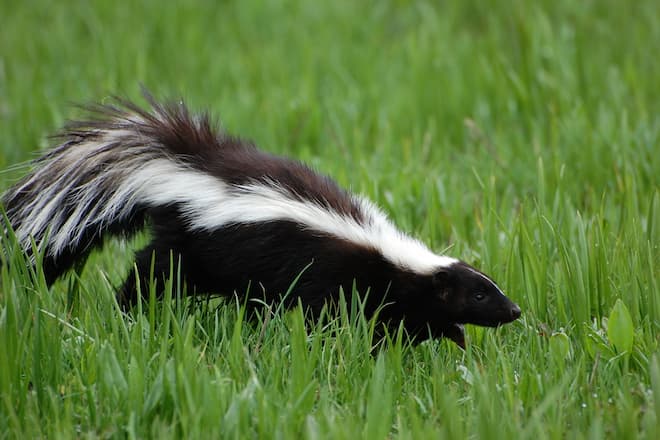Skunks, known for their distinct odour and black-and-white appearance, can harbour various parasites, including roundworms. These parasitic worms, also called nematodes, infect the intestines of skunks when they ingest contaminated food, water, or soil.
Bayliscaris Procyonis
One common roundworm species found in skunks is Baylisascaris procyonis, primarily found in raccoons but capable of infecting skunks as well. Skunks become infected by coming into contact with raccoon feces or contaminated environments containing roundworm eggs.
Symptoms in Skunks
While roundworm infections in skunks generally don’t show symptoms, heavy infestations can cause health problems. These worms reside in the skunk’s intestines, feeding on their ingested food. This can lead to malnutrition and overall weakened health, and in severe cases, intestinal blockages that are life-threatening.
Impact in Skunks
The impact of roundworms extends beyond skunks to wildlife, particularly raccoons. Raccoons are the primary carriers of Baylisascaris procyonis, and their feces contribute significantly to the presence of roundworm eggs in the environment. Skunks inadvertently become hosts when they encounter raccoon feces or contaminated areas.
Skunks and Human Health
Although roundworms in skunks do not directly affect human health, they pose indirect risks. The resilient eggs shed in skunk feces can survive in the environment for extended periods. Accidental ingestion of these eggs by humans, through contact with contaminated objects or soil and subsequent hand-to-mouth contact, can lead to infection. The eggs can hatch into larvae, which can migrate through various organs, including the central nervous system, causing severe damage.
Preventing roundworm infections in skunks and reducing the risk of transmission to humans involves several measures:
- Minimize direct contact with skunks and raccoons, including their feces.
- Securely cover garbage cans to prevent raccoons from accessing them.
- Remove potential food sources, such as fallen fruits and pet food, that can attract raccoons and skunks.
- Thoroughly wash hands with soap and water after gardening, playing outdoors, or handling pets.
- Educate children about the importance of not touching or approaching wild animals.
Skunk Control
If you have skunks on your property and are worried for the safety of your children and family, hire skunk removal specialists that can effectively and safely remove the skunks from the property. Skunk removal specialists make sure skunks are safely removed and make sure they won’t be able to come back ever again by patching the entry points with skunk-proof materials. Call

